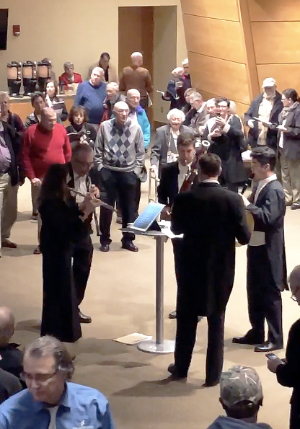
Photo credit: Brian Prechtl
In August 2018, the Baltimore Symphony (BSO) embarked on its first overseas tour in thirteen years, to wide acclaim. Over fifty supporters accompanied the BSO on the trip, and we received some very nice reviews as well as terrific response from live audiences.
To give a bit of a background, on July 3, Players Committee Co-Chair Brian Prechtl and I were surprised by a visit from our CEO, Peter Kjome, and board chair, Barbara M. Bozzuto, at the tail end of a rehearsal. They asked us to consider a four-month extension of the contract, with a pay freeze. We listened to their request as they told us that the BSO’s upcoming tour would provide an excellent opportunity to convert the good publicity into increased fundraising. Later in July, members of the Players Committee sat down with our management and made a counteroffer: we would accept a four-month extension, until January 15, 2019, if we got a 2% raise in the final week and if the BSO committed to hiring 83 full time musicians, which our contract already provided as the temporary minimum.
At that point, the orchestra was set to begin the season with only 77 full-time musicians. We suggested various ways that the BSO could get up to speed, including hiring multiple violinists in the November section violin audition (there are currently eight vacancies in a section of 30). Management turned down our offer.
When we returned from the tour, we faced a contract expiration date of September 9. On September 6, BSO management made exactly the same offer. We replied with the same counteroffer, insisting that more full-time musicians should be hired, and in addition, gave them a template for a longer contract, one that included requests for increases in compensation and improvements in various scheduling issues, etc. Our management took umbrage that we would have the nerve to ask for such improvements.

Marcia Kämper, Michael Lisicky, Schuyler Jackson, Phil Munds, and Lin Ma perform a pop-up concert. Management removed the music stands they had been using.Photo credit: Colin Sorgi
The contract expired on September 9, and we entered a play-and-talk period. BSO musicians leafleted the first weekend of subscription concerts, September 21–23, at Meyerhoff Symphony Hall in Baltimore and at Strathmore Hall, our major second venue in North Bethesda, Maryland. The flyer invited patrons to follow us on our social media platforms, and mentioned that we were playing under an expired contract. Patrons were distressed to learn that we were playing without a contract.
In early October, Brian and I had lunch, at our request, with Kjome and Bozzuto. We agreed that there should be another formal negotiation session. Shortly after that, we received a request to meet on October 30, and we agreed to do so.
Even knowing that BSO leaders had warned of a “cash flow crisis”—as they had now for years—we were still quite surprised to receive the offer made by the BSO on October 30. The proposal would cut our season from 52 to 40 weeks, along with a reduction in salary of over 16%. It also would increase the costs of health care, eliminate the employer contribution to our 401(a) retirement plan, cut guaranteed relief time, increase the number of nine-service weeks, and adversely modify dozens of other terms and conditions that have been fought for and achieved over the last 50 years. The total cost to musicians of all of these changes would in effect be a 26% reduction in musicians’ compensation.
As of this writing, BSO musicians have accepted the original offer of a pay freeze through January 15, 2019, while we work toward a long-term contract. We have experienced an unbelievable outpouring of support from the community of BSO audience members and donors, and remain hopeful that we can bring public opinion into the conversation, as we work with the management to achieve an acceptable resolution to this troubling situation.
Please follow us on social media, on Facebook @BaltimoreSymphonyMusicians, on Twitter @bso_musicians, and on Instagram @baltimoresymphonymusicians. More information is available on our website.
Note: The author is an ICSOM Member-at-Large and a Co-Chair of the BSO Players Committee.





